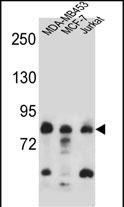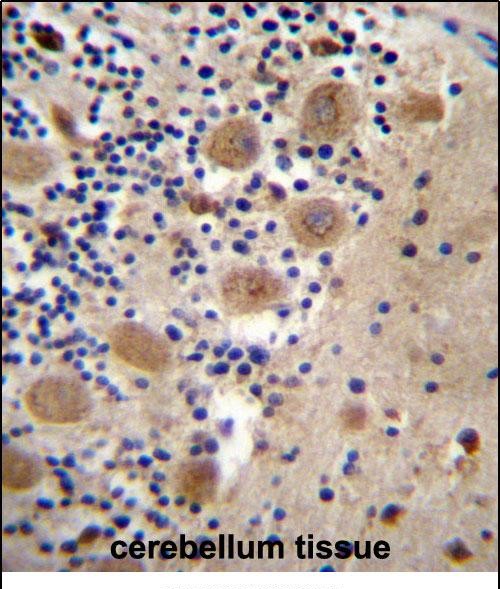AFG3L2 Antibody (N-term)
Affinity Purified Rabbit Polyclonal Antibody (Pab)
- SPECIFICATION
- CITATIONS: 1
- PROTOCOLS
- BACKGROUND

Application
| IHC-P, WB, E |
|---|---|
| Primary Accession | Q9Y4W6 |
| Other Accession | Q8JZQ2, Q2KJI7, NP_006787.2 |
| Reactivity | Human |
| Predicted | Bovine, Mouse |
| Host | Rabbit |
| Clonality | Polyclonal |
| Isotype | Rabbit IgG |
| Calculated MW | 88584 Da |
| Antigen Region | 52-80 aa |
| Gene ID | 10939 |
|---|---|
| Other Names | AFG3-like protein 2, 3424-, Paraplegin-like protein, AFG3L2 |
| Target/Specificity | This AFG3L2 antibody is generated from rabbits immunized with a KLH conjugated synthetic peptide between 52-80 amino acids from the N-terminal region of human AFG3L2. |
| Dilution | WB~~1:1000 IHC-P~~1:10~50 |
| Format | Purified polyclonal antibody supplied in PBS with 0.09% (W/V) sodium azide. This antibody is purified through a protein A column, followed by peptide affinity purification. |
| Storage | Maintain refrigerated at 2-8°C for up to 2 weeks. For long term storage store at -20°C in small aliquots to prevent freeze-thaw cycles. |
| Precautions | AFG3L2 Antibody (N-term) is for research use only and not for use in diagnostic or therapeutic procedures. |
| Name | AFG3L2 (HGNC:315) |
|---|---|
| Function | ATP-dependent protease which is essential for axonal and neuron development. In neurons, mediates degradation of SMDT1/EMRE before its assembly with the uniporter complex, limiting the availability of SMDT1/EMRE for MCU assembly and promoting efficient assembly of gatekeeper subunits with MCU (PubMed:27642048). Required for paraplegin (SPG7) maturation (PubMed:30252181). After its cleavage by mitochondrial-processing peptidase (MPP), it converts paraplegin into a proteolytically active mature form (By similarity). Required for the maturation of PINK1 into its 52kDa mature form after its cleavage by mitochondrial-processing peptidase (MPP) (PubMed:22354088, PubMed:30252181). Involved in the regulation of OMA1-dependent processing of OPA1 (PubMed:32600459, PubMed:30252181). Contributes to the proteolytic degradation of GHITM upon hyperpolarization of mitochondria (PubMed:35912435). Progressive GHITM degradation upon persistent hyperpolarization leads to respiratory complex I degradation and broad reshaping of the mitochondrial proteome by AFG3L2 (PubMed:35912435). |
| Cellular Location | Mitochondrion. Mitochondrion inner membrane {ECO:0000250|UniProtKB:Q8JZQ2}; Multi-pass membrane protein |
| Tissue Location | Ubiquitous. Highly expressed in the cerebellar Purkinje cells. |

Provided below are standard protocols that you may find useful for product applications.
Background
This gene encodes a protein localized in mitochondria and closely related to paraplegin. The paraplegin gene is responsible for an autosomal recessive form of hereditary spastic paraplegia. This gene is a candidate gene for other hereditary spastic paraplegias or neurodegenerative disorders.
References
Edener, U., et al. Eur. J. Hum. Genet. 18(8):965-968(2010)
Di Bella, D., et al. Nat. Genet. 42(4):313-321(2010)
Augustin, S., et al. Mol. Cell 35(5):574-585(2009)
Mariotti, C., et al. Cerebellum 7(2):184-188(2008)
Cagnoli, C., et al. Brain 129 (PT 1), 235-242 (2006) :
If you have used an Abcepta product and would like to share how it has performed, please click on the "Submit Review" button and provide the requested information. Our staff will examine and post your review and contact you if needed.
If you have any additional inquiries please email technical services at tech@abcepta.com.














 Foundational characteristics of cancer include proliferation, angiogenesis, migration, evasion of apoptosis, and cellular immortality. Find key markers for these cellular processes and antibodies to detect them.
Foundational characteristics of cancer include proliferation, angiogenesis, migration, evasion of apoptosis, and cellular immortality. Find key markers for these cellular processes and antibodies to detect them. The SUMOplot™ Analysis Program predicts and scores sumoylation sites in your protein. SUMOylation is a post-translational modification involved in various cellular processes, such as nuclear-cytosolic transport, transcriptional regulation, apoptosis, protein stability, response to stress, and progression through the cell cycle.
The SUMOplot™ Analysis Program predicts and scores sumoylation sites in your protein. SUMOylation is a post-translational modification involved in various cellular processes, such as nuclear-cytosolic transport, transcriptional regulation, apoptosis, protein stability, response to stress, and progression through the cell cycle. The Autophagy Receptor Motif Plotter predicts and scores autophagy receptor binding sites in your protein. Identifying proteins connected to this pathway is critical to understanding the role of autophagy in physiological as well as pathological processes such as development, differentiation, neurodegenerative diseases, stress, infection, and cancer.
The Autophagy Receptor Motif Plotter predicts and scores autophagy receptor binding sites in your protein. Identifying proteins connected to this pathway is critical to understanding the role of autophagy in physiological as well as pathological processes such as development, differentiation, neurodegenerative diseases, stress, infection, and cancer.


